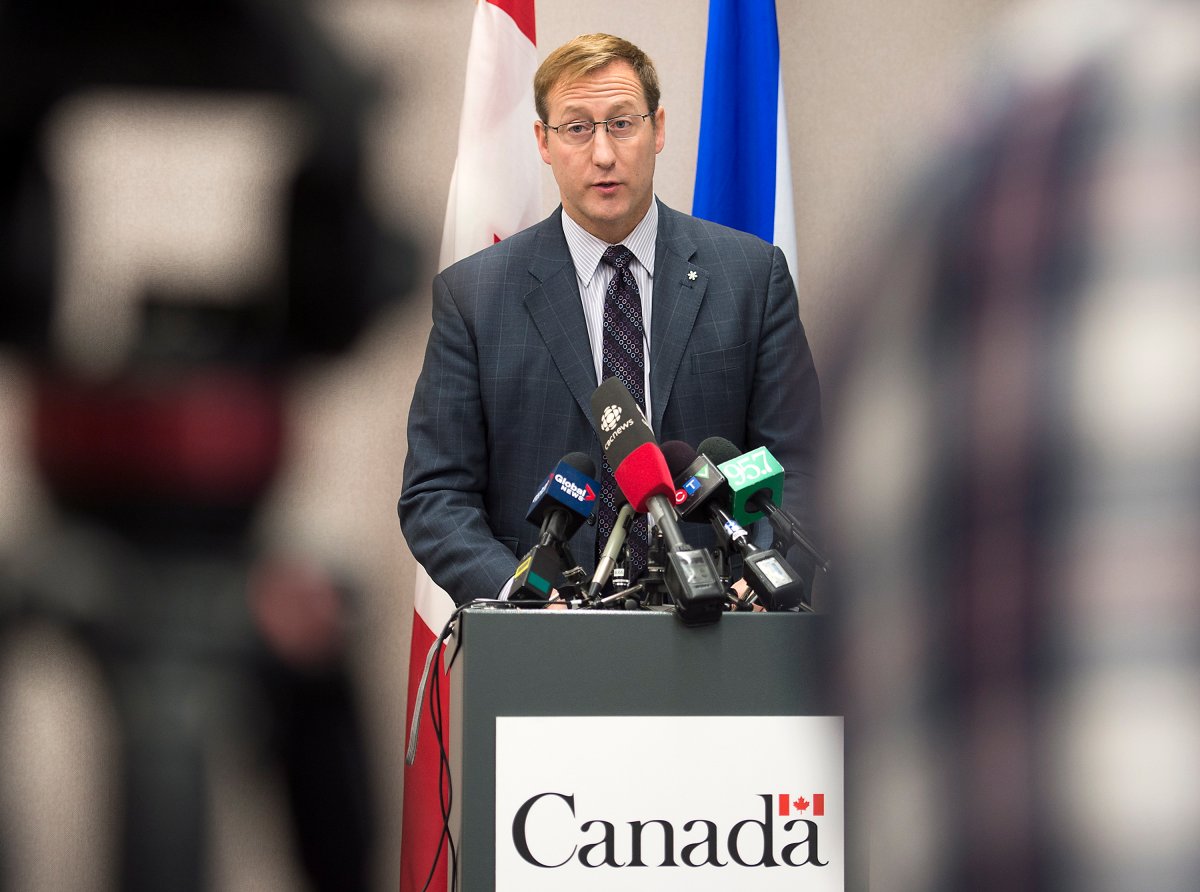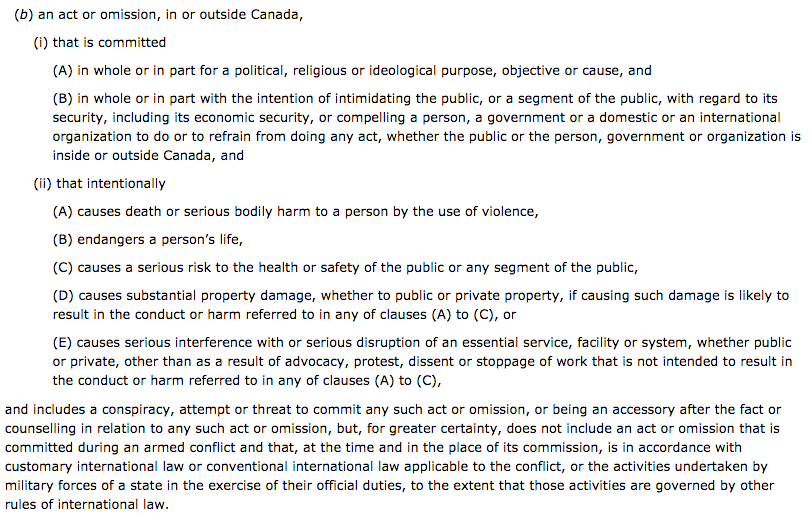Updated 2 p.m. Feb. 14 with a response to our query from a Peter MacKay spokesperson.

Updated 7:15 p.m. Feb. 14 with a revised statement from Peter MacKay spokesperson (below).
Justice Minister Peter MacKay surprised many when he said the threat of a foiled attack that would have killed multiple people in Halifax was real, but it didn’t count as terrorism.
It wasn’t “culturally motivated,” he told reporters Saturday morning.
“This appeared to be a group of murderous misfits, that were coming here, or were living here, prepared to wreak havoc and mayhem in our community …
“The attack does not appear to have been culturally motivated, therefore not linked to terrorism.”
READ MORE: MacKay says Halifax plot would have been devastating, but has no terror link
What does this mean?
Canada’s definition of terrorism refers to acts or omission committed, in whole or in part, “for a political, religious or ideological purpose, objective or cause.” It does not mention cultural motivations.
That whole subsection, taken from 83.01 (b) of Canada’s Criminal Code, is here:
- Posters promoting ‘Steal From Loblaws Day’ are circulating. How did we get here?
- Canadian food banks are on the brink: ‘This is not a sustainable situation’
- Video shows Ontario police sharing Trudeau’s location with protester, investigation launched
- Solar eclipse eye damage: More than 160 cases reported in Ontario, Quebec
MacKay spokesperson Clarissa Lamb, responding to a query from Global News as to why the minister had referred to cultural motivations, said MacKay “was simply relating his understanding of what law authorities have concluded at this point.”*
By the definition found in the Criminal Code, one could argue that Justin Bourque, who expressed an openly anti-police ideology on Facebook and elsewhere, was committing an act of terror when he went on a shooting spree in Moncton that killed multiple RCMP officers.
It’s harder to apply that definition to Michael Zehaf-Bibeau‘s fatal Ottawa shooting: The only hint we have that his attack was ideologically or religiously motivated is a video the RCMP has refused to make public.
We know very little, so far, about the mindset and motivation of the alleged plotters that RCMP say planned to open fire in a public place on Valentine’s Day.
Police have charged Lindsay Kantha Souvannarath and Randall Steven Shepherd with conspiracy to commit murder. Two others, a 17-year-old and a 19-year-old, are believed to have been involved; the 17-year-old was released without charge; the 19-year-old’s death in a Timberlea home is being investigated.
It is possible none of these people was motivated by neither politics, ideology or religion.
But we do know that Mackay’s “misfit” comment is, as both academics and the RCMP have found a fairly accurate characterization of the type of young person — often alienated, with a perceived grievance or a vulnerability to suggestion and desire to belong — who can be particularly vulnerable to radicalization.
Ziyaad Mia, with the Canadian Muslim Lawyers Association, says the “culturally motivated” phrase, while a technically incorrect characterization of the definition of terror law, also draws attention to how problematic the existing law is.
“This definition of terrorism that we’ve introduced is deeply flawed because it has this motive clause,” he said. “If someone wants to do mass violence to people, I don’t care why you’re doing it: You should be stopped and you should be punished.”
It can also make so-called terror cases much messier to argue in court, he says.
“You’ve put a prosecutor in the position of saying ‘What religion are you? Is this a political thing? That really muddies the waters.”
Instead, Mia argues, it makes more sense to define terrorism based on the act itself: On terrorizing a community, for example.
“To me, the law should be clean. … Adding all this baggage, you’re injecting political complications into the law.
“It’s bad law and doesn’t make us safer.”
He’d also rather see a much greater government focus on preventing the radicalization of young people who may feel like the “misfits” Mackay describes — giving them a sense of belonging and positive outlets for frustration so they’re less likely to turn to violence.
“These so-called ‘homegrown radicals’ are also murderous misfits, potentially. We should stop any young person, whoever they are whatever, colour, whatever faith, who is going down the road of becoming a murderous misfit,” he said.
“It doesn’t sound as tough, but I think addressing these issues with youth is going to be much more effective in keeping everyone safe.”
READ MORE: Are you already violating the feds’ anti-terror law?
While the phrase MacKay used is an inaccurate characterization of the law, University of Ottawa law professor Craig Forcese, who has extensively analyzed federal terror law, said in an email it’s likely an allusion to the religious motivation aspect of the terrorism definition.
“If his point was, instead, that cultural (aka religious) motivation is the sole legal basis for terrorism charges, then that would be a mistaken interpretation of the law.”
But that also reflects the way terror law has historically been treated by prosecutors in Canada, Forcese noted. He points to events such as the Moncton shooting that arguably meet the definition of terrorism but weren’t prosecuted as such because there was no religious motivation evident.
“The risk is, therefore, that our antiterror criminal law will be perceived, not as criminalizing political violence regardless of the cause, but aimed in practice at one particularly concerning and notorious form of political violence — the religious AQ/ISIS inspired brand.
It would be useful, therefore, for the political executive not to facilitate this impression.”
Peter MacKay’s spokesperson Clarissa Lamb emailed Saturday evening with a revised statement:
“We understand that law enforcement have now laid charges against these individuals and we cannot comment further on this particular case. Minister MacKay was simply relaying his understanding of what law enforcement authorities had concluded at that point.”





Comments